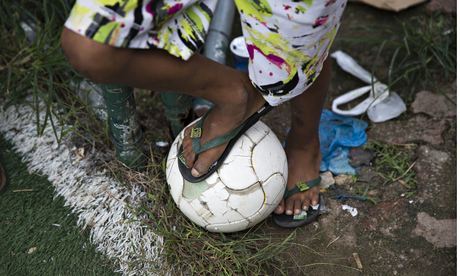What will the 2014 Fifa World Cup mean for Brazil’s young people?

Among the 34 million young people aged between 15 and 24 in Brazil, more than a third (35.2%) are neither in work nor study.
Yet, with Brazil emerging as the sixth largest economy in the world, and with large-scale investments planned in infrastructure and extractive industries, the future could be promising. Upcoming major sporting events – the Fifa World Cup in 2014 and Olympic Games in 2016 — are expected to bring a new dynamism to industries such as tourism, commerce and services.
As industries in Brazil increase their growth predications for the coming years, should the country's youth be reassured of their prospects?
There is a growing demand in the Brazilian economy for workers in the service industries, with a particular focus on values and behaviours, rather than technical knowledge. But for families living in poverty, access to education opportunities that would help acquire these skills remain limited.
Fortunately, the recognition of the need to increase youth employment has been growing among the country's policymakers since the early 2000s. There are 16 federal youth programmes including the Provojem Trabalhador, preparing young people for the labour market, Projovem Urbano which has an education focus and Pronatec, which helps young people acquire technical skills.
First job programmes have also been promoted. It is now mandatory for large and medium-sized businesses to hire teenagers and young people between 14 and 24 years for a period of up to two years. They are hired by companies as apprentices, which also makes it compulsory for young participants to attend school or training institutions. According to current legislation, the percentage of apprentices in a company needs to be between 5% and 15% of the workforce.
The government has high hopes that coming sporting events, will further improve the situation. The main work opportunities related to the World Cup are in construction, information technology, tourism, retail, services, clothing, wood and furniture and agribusiness.
While these events provide an opportunity they are not necessarily the silver bullet. The real challenge will be in translating these opportunities into long-term employment. The majority of young people in Brazil enter the labour market into precarious jobs, and once they begin working, they often drop out of school, making it difficult for them to access better work in the future. This starts a cycle of economic insecurity and instability that follows them throughout adulthood.
The key to breaking the cycle is ensuring that young people have adequate education as well as access to on the job training. Plan International in partnership with the Arena das Dunas, the World Cup stadium in Natal, has been working with local young people struggling to find work.
The programme Goals for a better life which was launched at the start of the year, will in the short-term employ 150 vulnerable young peopleas stewards and hosts during and after the event. The selected youth are from historically deprived communities. Frequently they come from violent backgrounds, have little or no access to quality education, and struggle to access the formal job market. This often leaves them at risk of getting involved in illegal activities.
To ensure that the young people benefit from the experience in the long-term we intend to develop their life skills – as defined by the World Health Organisation. This includes the capacity to deal with stress, assertive communication and critical thinking. These abilities empower young people to have a healthier interaction with the job market as well as their own families and communities.
The next phase of the project will offer vulnerable youths more in-depth vocational training and coaching for a full-time job. The goal is to establish a sustainable training and business centre at the stadium.
The Fifa World Cup presents a real opportunity for Brazil's young people, but lowering unemployment numbers in the short term is not enough. The opportunities need to remain long after the tourists and athletes have returned home. Neither the government nor the development community can do it alone. Working in partnership as Goals for a better life tries to do is the only way to provide employment that is not only decent, but also long-term.